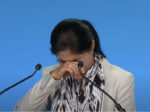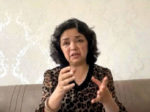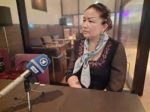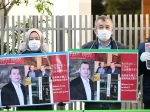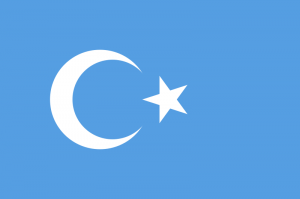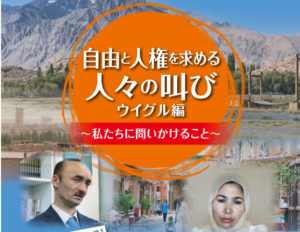Caution Required Against China’s Propaganda
- 2021/11/11
- English
From the beginning of this year, the human rights issue concerning the Uyghurs has taken a new turn.
By Afumetto Retepu
WORLD INSIGHT, November 11, 2021 | Last updated May 6, 2022
Afumetto Retepu (Vice Chairman, Japan Uyghur Association)
From the beginning of this year, the human rights issue concerning the Uyghurs has taken a new turn. With global criticism and heightened calls to hold China to account, China, desperate to deny, has countered with global-scale propaganda. This is apparently a shift from the previous style of getting away by repeated excuses and deceptions.
I believe their previous way of sending out information was to buy time with the second lie when they are caught with the first one. As they kept this up, the international community would get used to the status quo and accept the situation. That was the strategy.
Us Uyghurs began appealing about the existence of the mass internment camp around early 2017. For almost two years since then, the Chinese government had continued to deny entirely the existence of such facilities. However, no longer able to deny with various evidence reported, China suddenly reversed its attitude and acknowledged the existence of the facilities. Then they imposed their propaganda that these were “not internment camps, but fine education centers.”
But this scheme also failed. Beijing came under harsh criticism from the international community demanding site investigation. Then what happened? In October 2019, a year after admitting the existence of the facilities, Beijing said they “closed all facilities and sent everyone home.”
China is still making this claim, but we cannot possibly believe it. They have repeatedly accumulated lies and prohibit unlimited access to the site. China still does not agree to a visit by the United Nations investigation team. If they have done nothing wrong, there is nothing to hide. Yet they are desperate to hide some inconvenient truth.
Attack on Individual Targets
Instead of allowing unlimited access to the sites, China rapidly rolled out a counterattack by propaganda on a global scale.
According to a think tank analysis reported by the U.S. Wall Street Journal, the Chinese government’s propaganda activity on social media over the Uyghur issue reached an all-time high. Especially on Twitter, Uyghur-related posts by Chinese state media and diplomatic accounts amounted to an average of almost 500 tweets per month, almost double the prior year’s postings.
China has blocked Facebook since the July 2009 Ürümqi riot. But recently, ads portraying Uyghurs leading happy lives have skyrocketed. Uyghur residents, including children and the Ürümqi City mayor appear in Facebook ads, appealing they have never been happier, while criticizing that the West is plotting a conspiracy.
Beijing is deploying an expansive propaganda counterattack, including criticism of “the West’s hegemony of speech” and attacks on individuals such as politicians and researchers critical of China on the Uyghur issue. Persistent attacks on those criticizing Beijing on the Uyghur issue are especially prominent.
The most typical example is the personal attack on the world-famous German researcher Adrian Zenz, known for his study of the Uyghur issue through analysis of Chinese official documents. In April, China’s state-run Xinhua News Agency accused Mr. Zenz, calling him “a puppet of anti-Chinese forces.”
China’s government think tank Xinjiang Development Research Center even revealed a report titled “Slanderer Adrian Zenz’s Xinjiang-related Fallacies Versus the Truth” and declared to sue him.
Xinhua News Agency followed with an article on April 30, stating, “Not only Adrian Zenz, but all anti-China forces that disseminate false information and attempt to hurt Xinjiang shall pay the price.”
The Twitter account of the Chinese embassy in Japan also attacked with a tweet on April 29: “The lie-producer of the century, German Adrian Zenz, who is the U.S.’s favorite information source and waging jihad against China by so-called divine guidance, is also the person found to be bribed by the BBC. He has been banned from the sacred shrine of academia the moment he threw out the spirit of science and sold his soul to fake-news money.”
It has become clear that BBC’s Beijing correspondent John Sudworth, known for infiltrating coverage of the Uyghur internment camps and providing multiple shocking reports, has moved to Taiwan due to pressure and threats from the Chinese authorities. Regarding this case, the BBC has announced a statement saying, “John’s reporting has exposed truths the Chinese authorities did not want the world to know.”
Attacks have extended to research institutions that have revealed “inconvenient truths.” One such target is the Australian think tank ASPI, known for releasing several investigative reports on the forced labor issue, demolition of mosques, and expansion of detention facilities.
The Twitter account of the Chinese embassy in Japan posted: “Australian Strategic Policy Institute (ASPI) is a non-independent research institution that receives support from Australia’s Department of Defense, NATO, and U.S. Department of Defense. ASPI claimed that from 2017 to 2019, at least 80,000 Uyghur residents were transferred from Xinjiang to other regions under ‘forced migration’ and ‘forced labor.’ Believe it or not, the evidence was provided by a far-right Italian blogger who supports the Falun Gong and Aum Shinrikyo. To replace the truth with the contents of this report, Australian media such as the ABC did not hesitate to threaten local Chinese residents in the interviews to admit this report.”
China is desperate to silence people who pursue the Uyghur issue, even using sanctions and intimidations. It is also actively sending out fairy tales of the “happy Uyghurs.”
Naturally, if you ask whether this propaganda has won the hearts of people in democratic countries, the answer is no. In reality, it has not worked as expected. So now, instead of sending out messages themselves, the Chinese authorities are actively adopting the method of having other people speak for them.
Specific cases include having pro-Beijing foreign scholars say things. In another case, a foreign tourist visiting Xinjiang posts a YouTube video and denies the report that Uyghur people are suffering.
This April, the People’s Daily highly publicized a video taken by an Israeli man living in China who travelled to Uyghur. The man claims in the video, “There is no such thing as forced labor in Xinjiang,” “Accusations of the West are groundless,” “genocide is a label by the West,” and “People are living liberated lives and there are absolutely no cases of detainment.”
Uyghurs in China Forced to Act Out
One of the propaganda tactics China is focusing on is forcing Uyghurs within China to make videos that ask their relatives living abroad to remain silent. Beijing actively promotes these videos.
China Global Television Network (CGTN), the international broadcast of China Central Television (CCTV) which lost its broadcasting base in Europe this February, is especially active. CGTN has pulled up Uyghurs living in China in front of the camera in a succession to put pressure on relatives living abroad.
There are roughly two patterns of Uyghurs appearing in those videos. One is the families of the internment camp survivors. When the few survivors who experienced the internment camp and fled abroad testify their story to the international community, authorities drag their families remaining in China in front of the camera, and make them denounce the testimony and express gratitude towards the Chinese government. Beijing frequently airs such videos.
The other is the families of those who have spoken up seeking freedom or information about their families they lost touch with. Coerced to appear on video and appeal a happy life owing to the Chinese authority, they criticize their families for voicing concern about their whereabouts. China also frequently streams these videos.
The human rights organization Uyghur Human Rights Project analyzed 22 such videos this January and released a detailed report titled “The Government Never Oppresses Us: China’s proof-of-life videos as intimidation and a violation of Uyghur family unity.” These videos continue to be broadcasted after the release of the report.
I have completely lost contact with my family in Xinjiang since July 2017. No matter how many times I call or send messages on social media, I get no response. At this age, when the entire world is connected by radio waves and the internet, I cannot make a single call to my family all these years.
There are many Uyghurs in Japan and around the world searching for their missing loved ones. How could they be convinced by videos that say “Your family is leading a happy life so shut up,” while being severed of communication means with their families in Xinjiang? I would like the readers to consider how despicable and unbearable this act is.
Propaganda Also in Japan
Counterattacks by propaganda is also spreading in Japan. The Chinese embassy account posts tweets on the Uyghur issue almost every day.
Most notable are the attacks on the survivors of the internment camps. This may be in response to increased coverage of the survivors by the Japanese media.
For example, an attack on Mihrigul Tursun, the main character of the manga “What Has Happened to Me: A testimony of an Uyghur Woman” by the manga-artist Tomomi Shimizu, was posted on April 6. An attacking tweet towards Sayragul Sauytbay, one of the main characters of the manga “No One Will Say the Name of That Country” also by Shimizu, was also posted.
An attacking post towards Tursunay Ziawudun was posted on April 6. She testified to the BBC about the sexual abuse she received at the internment camp, which was also widely covered by the Japanese media. The attacking post towards Zumret Dawut, a survivor who testified to TBS and several other Japanese media about the forced sterilization she received, was posted on April 29.
China is also adopting methods of having Uyghur and Japanese scholars speak for them.
On April 29, the China-Japan Youth Industry Academic Association held an online presentation (Zoom) titled “Youth in Japan Talks About His Home Xinjiang Uyghur.” At this speaking session, an Uyghur and a Mongolian living in Japan, Professor Satoshi Tomisaka of Institute of World Studies at Takushoku University, and Professor Zhu Jianrong of Toyo Gakuen University came on stage and claimed that the Uyghur issue is merely labelling by the West.
The Uyghur speaker was Pahirdin Parhat (25) from Urumchi in Uyghur. He opened his speech with “Uyghurs receive VIP treatment from birth until they die,” and closed it with “If Uyghur becomes independent, it will become the next Iraq or Afghanistan. The people don’t want their country to be like Iraq or Afghanistan, so the current situation is the best.”
He speaks in a soft and friendly tone, but laced his speech with harsh words used for denunciation as if complying with the views of the Chinese government. The way he blatantly praised the Chinese policy on Uyghur was also strange.
I have lived in Japan for about 20 years and have come into contact with many Uyghur communities. Yet despite my efforts in inquiring, not a single fellow countryman had any contact with this young man. I hear he went to high school in Guangdong Province and university in Beijing, and came to Japan as an exchange student in 2017. He has been active in multiple events as a member of the China-Japan Youth Industry Academic Association. He seems to live as a member of the Chinese community, with no relations with the Uyghur community in Japan.
The most notable point was his statement: “There are halal supermarkets in Xinjiang. They recognize the Islamic holidays as statutory holidays, and you don’t have to go to school. You don’t have to work. But in the U.S., even though there are quite a lot of Muslims, they don’t let you celebrate the Islamic holidays by taking the day off at school or work. The official holidays are all Christian.”
Every time criticism on the Uyghur issue arises, they divert the point by bringing up human rights abuse by the U.S. It’s a gimmick the Chinese authorities often use. They recently posted an article titled “The U.S.’s Five Sins on Human Rights” also reported on the Japanese edition of the People’s Daily Online, in response to the criticism that the Uyghur issue is a genocide. The first sin on the list is the cruel slaughtering of Native Americans. Hua Chunying, the spokesperson of China’s Ministry of Foreign Affairs, rebutted in a regular press conference that “the U.S. also has a history of massacre and discrimination of indigenous people.”
However, this statement indirectly admits the massacre of Uyghurs. Because the slaughtering of the Uyghurs exists, as we say, and Beijing has to hide and deny this at all costs, it says the U.S. also has precedence of genocide to make it seem relative. Supposing the Xinjiang massacre did not exist, China does not need to say you also committed genocide in the past.
The speaker also said, “In China, the National People’s Congress secures 12% of the seats for ethnic minorities. There are 36 seats for the Huis, 26 for Mongols, 24 for Tibetans, and 21 for Uyghurs, so they reserve about 60 seats for Muslims. Japan’s House of Representatives doesn’t have seats for Ainus, does it?” He also said, “TV stations in Xinjiang have many Uyghur language channels. The Uyghurs have their own actors and singers. They have celebrities and even comedians. Japan doesn’t have Okinawan or Ainu TV channels…”
They bring up Japan’s human rights issues, especially those that serve their interests, and shift the point in question. This too is the tactic Professor Zhu Jianrong of Toyo Gakuen University often uses in TV debates. General Uyghur people certainly won’t come up with such ideas.
In his speech, Professor Zhu’ said, “International terrorist organizations and other state forces invite the unemployed or those not attending school to go to Afghanistan or Pakistan, and brainwash them to use guns and bombs. Then they dispatch them again to Xinjian and to trigger attacks.”
He cites the July 5, 2009 Ürümqi riots as a specific example, which is beyond absurd. No one in the international community believes that international terrorist organizations caused the Ürümqi riots.
All the speeches in the session were completely in line with the motivations and distributed contents of the Chinese embassy.
On April 20, the Chinese embassy tweeted, “In the last-minute rush before the end of his term, former U.S. Secretary of State Pompeo told a blatant lie that China is committing ongoing genocide against Uyghur Muslims in Xinjiang, without the slightest evidence. Since around 2007, Xinjiang has suffered a series of terrorist attacks with over 1,000 deaths and countless injuries. The terror attack on July 5, 2009 alone caused 197 deaths and 1,721 injuries.”
Judging from his words, the young Uyghur speaker seems to know very little about the Uyghur history, and appears to be a person who chose to be “the good Chinese.” There are 10 million Uyghurs, so it may be no surprise such persons exist. But I strongly hope this will not confuse or fool the Japanese public and media unfamiliar with the situation.
Professor Satoshi Tomisaka of Takushoku University was a shame. He said, “The delivery of these speeches is really significant,” “The Western media deserve their criticism,” “We have market constraints. The market prefers radical content, so it gets more and more extreme,” and commented to the effect that the Uyghur issue was labelling by the Western media in pursuit of sensational impact.
Does he not know that not only the Western media, but Mainichi Shimbun and many other Japanese media have covered Xinjiang and reported that the Chinese government’s explanations are ridiculous? In the future, the Chinese authorities is sure to use many Japanese and distribute information in line with their intent. Witnessing this event, I was convinced Beijing would strenuously launch such propaganda campaigns.
Afumetto Retepu
Born in 1977 in Kalpin County, a town in southern Uyghur. Graduated the Physics Department of Kashgar University in 2001. After coming to Japan for studies, now works at a Japanese IT company in Tokyo. Became a naturalized Japanese citizen in 2010. Vice-chairman of Japan Uyghur Association.
https://worldinsight.com/news/politics/japanese-people-used-to-promote-chinese-propaganda/


